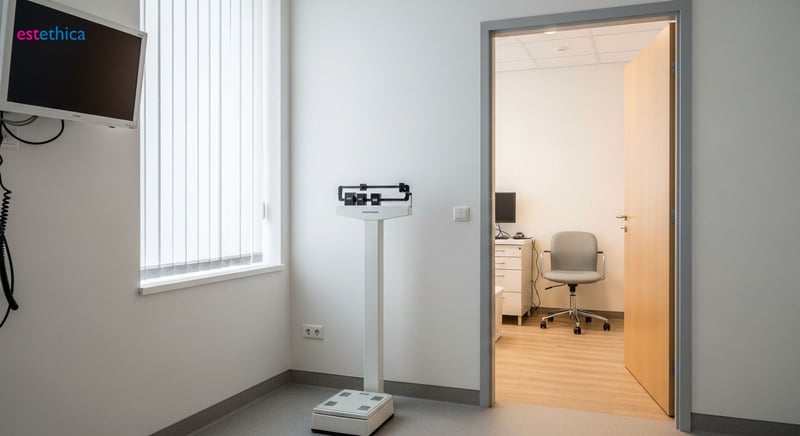Beyond the Scale: Comprehensive Guide to Bariatric Surgery
Discover if weight loss surgery is the right choice for you and uncover the benefits of modern bariatric procedures.
Bariatric surgery has emerged as a significant option for those seeking effective weight loss solutions beyond conventional methods like diet and exercise. This article will explore whether weight loss surgery is the right path for you by examining the qualifying criteria, types of surgeries, and innovative techniques available.
Qualifying for Bariatric Surgery: What's Your BMI?
BMI Thresholds and Bariatric Qualification
Qualifying for bariatric surgery primarily involves assessing the Body Mass Index (BMI). Candidates typically have a BMI over 40, or a BMI over 35 alongside obesity-related health conditions. Beyond these numbers, psychological readiness and commitment are crucial aspects of a comprehensive evaluation. Factors include cardiovascular health, history of sleep apnea, and previous attempts at weight loss. For example, an individual with a BMI of 36 and type 2 diabetes might qualify, while someone with a BMI of 39 and no related health issues may need further assessment. Surgical options like Sleeve Gastrectomy are important to consider.
Key Factors in Bariatric Surgery Candidacy
- BMI as a Primary Indicator: A BMI above 40, or above 35 with comorbidities, frequently meets initial qualification standards.
- Psychological and Emotional Readiness: Necessary for adhering to the post-operative lifestyle changes, including diet and exercise.
- Commitment to Lifestyle Changes: Sustained efforts in diet and exercise are essential for the success of bariatric procedures.. Weight Loss Surgery can be a great option in this process.
The ultimate decision is based on medical evaluation. For example, those showing a dedication to lifestyle changes typically demonstrate greater success.

Gastric Bypass vs. Sleeve Gastrectomy: Which is Best?
Comparing Surgical Weight Loss Approaches
Gastric bypass and sleeve gastrectomy represent two distinct approaches in the realm of weight loss surgery. Gastric bypass, known for rerouting the digestive system, often yields substantial weight reduction, necessitating significant long-term dietary modifications. This procedure aids in diminishing hunger sensations by reducing the stomach's capacity and altering gut hormones.
Sleeve gastrectomy, on the other hand, involves the removal of a portion of the stomach, resulting in a smaller, sleeve-shaped stomach. This method is generally less invasive, appealing to individuals who want a simpler surgical path. While both procedures have a similar goal, the choice depends on individual health profiles and preferences.
Factors Influencing Bariatric Surgery Choice
- Surgical Invasiveness: Sleeve gastrectomy is usually less invasive, reducing possible post-operative complications.
- Dietary Adjustments: Gastric bypass often necessitates more extensive and lifelong dietary changes.
- Long-Term Weight Loss: Gastric bypass may provide a higher degree of initial weight loss, but long-term success hinges on lifestyle adjustments.
The decision between gastric bypass and sleeve gastrectomy requires an assessment. Considering factors like surgical complexity and individual health goals is necessary. estethica Global provides detailed consultations to help patients make informed decisions tailored to their specific needs.

Robotic Bariatric Surgery: Exploring the Benefits
Advantages of Robotic Assistance in Bariatric Procedures
Robotic bariatric surgery enhances a surgeon's capabilities through increased precision and control. The systems, equipped with high-definition 3D visualization and flexible instrumentation, allow for intricate maneuvers in confined spaces. The technique translates to reduced trauma, minimal scarring, and lower rates of complications for patients undergoing weight loss surgery, with many experiencing a quicker return to daily activities. Unlike conventional methods, robotic surgery refines the execution of procedures such as gastric bypass and sleeve gastrectomy, optimizing patient outcomes. Robotic surgery is also used in Obesity Treatment.
Key Benefits of Robotic Bariatric Surgery
- Enhanced Surgical Precision: Robotic systems facilitate complex surgical tasks with enhanced accuracy and smaller incisions, leading to minimal tissue disruption.
- Reduced Post-operative Discomfort: Smaller incisions typically result in diminished discomfort, shorter hospital stays, and quicker recovery periods.
- Improved Visualization: High-definition 3D imaging offers surgeons better visualization of the surgical site, thus optimizing surgical results.
estethica Global adopts this cutting-edge approach to Bariatric Surgery, ensuring that patients experience these advanced benefits in their weight loss journey.

Obesity Treatment: Charting Your Weight Loss Journey
Long-Term Strategies for Sustained Weight Management
Completing a successful bariatric procedure is only the beginning of a lifelong journey towards health. Post-operative guidelines often include specialized nutrition plans, regular monitoring, and sustained lifestyle changes. Aligning expectations with realistic goals ensures lasting success in managing obesity. For example, patients may begin keeping a detailed food diary to track caloric intake and nutritional balance, alongside scheduling regular check-ups with nutritionists. Such actions are integral to reinforcing positive habits and preventing weight regain. Consistent physical activity, such as walking or swimming, complements dietary adjustments. Many find support groups invaluable for fostering a sense of community.
Essential Post-Surgery Practices
- Nutritional Planning: Adhering to a diet is vital for nutrient absorption.
- Regular Monitoring: Scheduled follow-ups with healthcare providers help optimize health outcomes.
- Lifestyle Adjustments: Incorporating exercise into daily routines is crucial.
Maintaining a healthy lifestyle involves adopting personalized approaches. Consider these strategies. Through comprehensive support and a commitment to long-term health, individuals can achieve lasting success. estethica Global provides ongoing support and guidance to help patients make these essential lifestyle changes.
Understanding Bariatric Surgery: A Comprehensive Guide
Robotic Bariatric Surgery: Enhanced Precision for Improved Weight Loss Outcomes
Personalized Obesity Treatment: Emphasizing Sustained Health Through Dedicated Support
Frequently Asked Questions
What are the primary qualifications for Bariatric Surgery?
What is the difference between Gastric Bypass and Sleeve Gastrectomy?
What are the benefits of Robotic Bariatric Surgery?
What does the post-operative journey for Obesity Treatment entail?
Achieve your aesthetic goals with personalized solutions and expert care.
📞 Get Your Free Consultation!